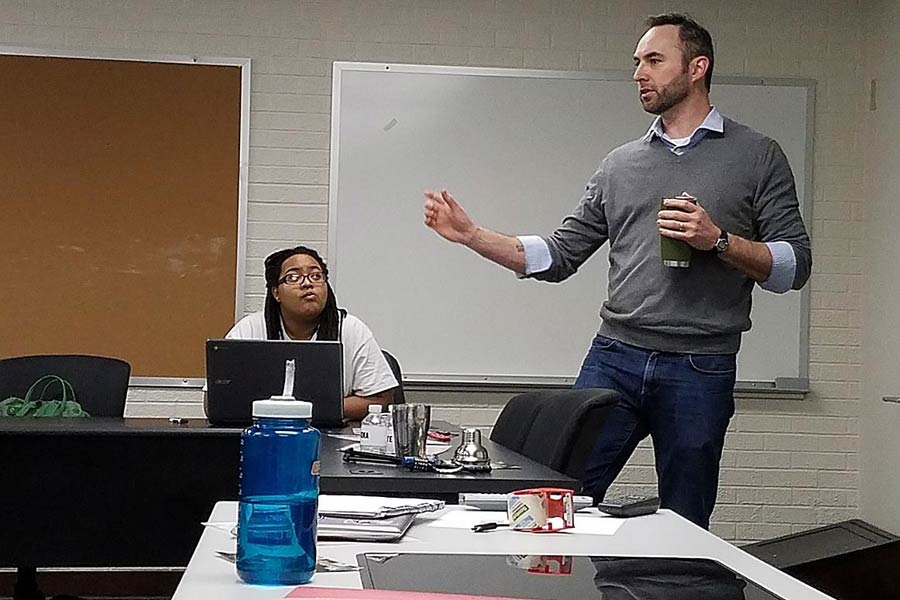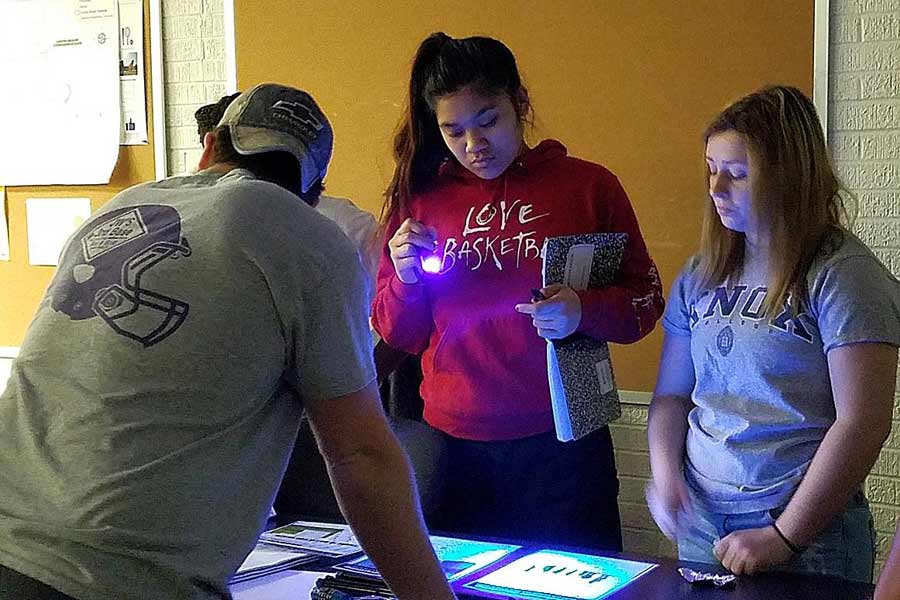

Knox Professor Engages Students with Escape Room-Style Puzzles in Class
by Matt Koester, The (Galesburg) Register-Mail
Originally published March 8, 2018, and reprinted with permission
On the first day of Eric Dickens' Adolescent Development class at Knox College, students might have thought they knew what to expect: A look over the syllabus, a discussion of reading material, maybe some group discussions. Instead, they walked into a mystery.
Dickens' class, they found out, was no ordinary course. While they'd still be covering the usual material, taking paper tests and writing a paper, the classwork would play out in a series of "escape room"-style puzzles.
The education and psychology class situates its students as members of the "Adolescent Development Detective Agency," seeking to use their knowledge of adolescent behavior and psychology to solve a series of daily puzzles. Nearly every day of the tri-weekly class features a new puzzle, with puzzles broken into different challenges that require command of the material found in the class's reading assignments.
"This is all really a tricky way to get students to read for class," Dickens said. "Some teachers will subtract points or have a quiz to motivate reading, but that's just extrinsic motivation. I wanted the intrinsic motivation."
Students have to work collaboratively to move through the puzzles. Instead of being worried about being docked grade points, they read so they don't let down their fellow detectives. When students finish the puzzle, which generally runs on a half-hour time limit, they discuss how they arrived at their conclusion with Dickens, who helps explain the connection between the puzzles and the readings.
"Last year I taught this class in the spring in a room that has stadium-like lecture seating. I found myself teaching in that way and I wasn't really enjoying it," Dickens said. An Education Psychologist, he wasn't satisfied with the lecture hall as a teaching method, and looked for a new way to teach the material.
Last summer, Dickens recalls going to an escape room with friends. Working alongside his friends to solve puzzles and riddles and clues was engaging, but the thing that really stuck with him was the way he still remembered the puzzles' solutions months later.
Knowing that traditional lecture-based classes struggled in this kind of memory retention, Dickens began adapting his syllabus to the structure of an escape room with the help of his wife Jennifer, an education professor at Monmouth College.
The class originally was meant to be taught simultaneously at Knox College and at Monmouth College by Dr. Craig Vivian, Monmouth's Education chairman, but Monmouth's enrollment in the class ended up being too low to support the game. Still, Vivian, a big proponent of game elements in teaching, has been a major asset to the class, and will be using the escape room format the next time he teaches the class.
The class isn't exactly a standard escape room. Students aren't locked in the classroom. Instead, the class works each day to open one of many mystery boxes on the way to solving a central mystery.
Each box holds a fragment of a letter sent from Sam, a fictional adolescent who ran away from home at the beginning of the narrative.
Only when the class finishes the final puzzle and assembles the letter will it be able to solve the mystery and find Sam. Dickens' wife has illustrated different locations at which each puzzle takes place on a map, with the class visiting a new location every week that sets the tone of the narrative. Last week, for example, they "visited" a bar when learning about substance abuse in adolescents.
"It's one of the most engaging classes I've had here at Knox," sophomore Danielle Cervas said. "We're basically teaching ourselves."
The amount of work that goes into the classes three weekly puzzles isn't light. In Dickens' estimate, every half-hour puzzle can take as long as 12 hours to put together. He's still making up the puzzles as the class goes along, though, and the workload should be lighter the next time he teaches the class and can work off of the same curriculum.
His aim is eventually to compare the test scores, as well as students' ability to recall information of the class after it has ended, with those of students who took the class in a lecture hall style, to see how effective the format really is. He says the escape room is just one of many ways teachers can make their classes more engaging, and in the process facilitate deeper learning and understanding.
In a course often taken by education studies students, it's also a way to demonstrate collaborative learning. He said he'll have two education studies students in the classroom next term to audit and help teach the class primarily so they can see an example of a collaborative classroom. When many new teachers begin, he said, they teach by lecturing and small group discussions because that's what they know. The best way to encourage new methods of teaching is to model them.
Senior American Studies major Amy Lintz recently applied to the JET program, which sends individuals to work in Japanese schools, boards of education, and government offices. She said she took Dickens' class because of the potential that she would soon be teaching. She's not sure if she would implement a classroom exactly like Dickens', but she's found the class compelling as a potential educator.
"It's maybe my favorite class at all of Knox," she said. "It's not just a test or a quiz. You have to use the information. Class time is basically study time,"
Eric Dickens said he hopes to help educators expand their ways of teaching.Those with questions, or interested in observing the class can email him at emdickens@knox.edu.
(Photos by Matt Koester/The (Galesburg) Register-Mail. Photo at top: Eric Dickens teaches students in his Adolescent Development class. Photo below: Students in the class use a black light to uncover clues to a puzzle. )
Published on March 27, 2018


